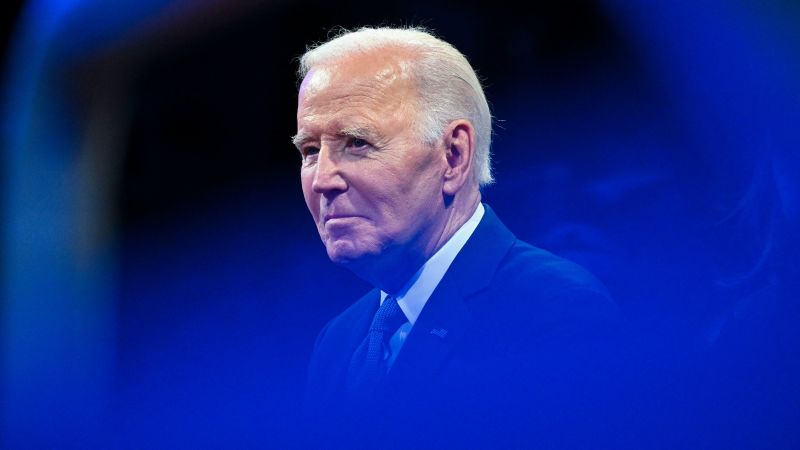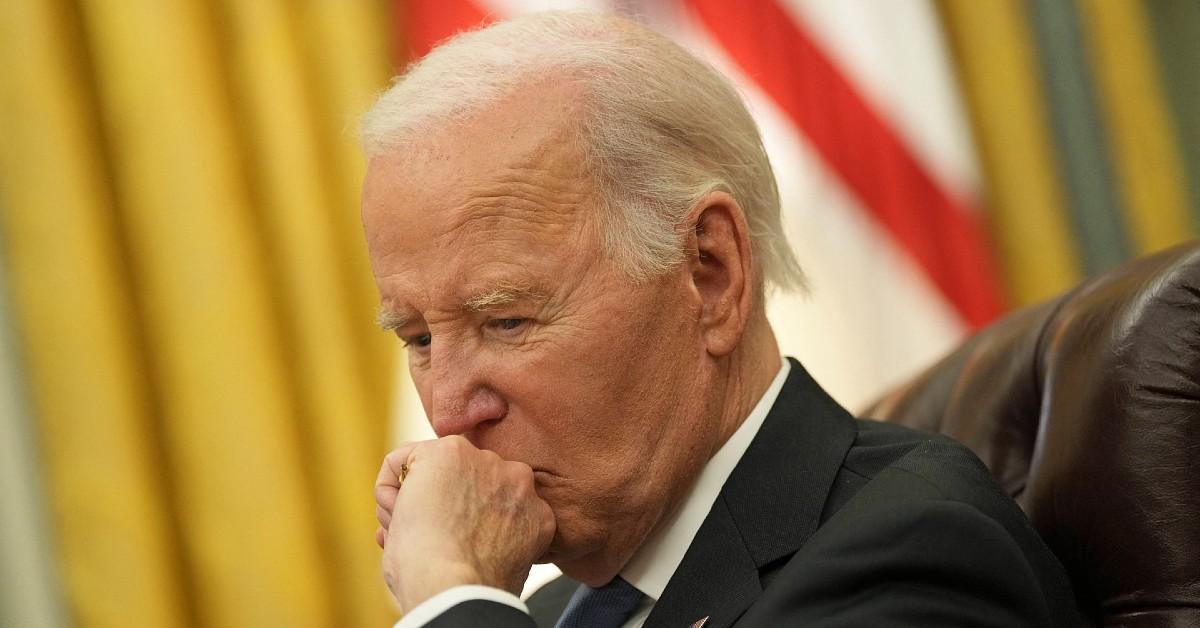Washington
CNN
—
President Joe Biden announced a major opinion Friday that the Equal Rights Amendment is ratified, enshrining its protections into the Constitution, a last-minute move that some believe could pave the way to bolstering reproductive rights.
It will, however, certainly draw swift legal challenges – and its next steps remain extremely unclear as Biden prepares to leave office.
The amendment, which was passed by Congress in 1972, enshrines equal rights for women. An amendment to the Constitution requires three-quarters of states, or 38, to ratify it. Virginia in 2020 became the 38th state to ratify the bill after it sat stagnant for decades. Biden is now issuing his opinion that the amendment is ratified. It would next fall upon the archivist of the United States, Dr. Colleen Shogan, to certify and publish the amendment.
“It is long past time to recognize the will of the American people. In keeping with my oath and duty to Constitution and country, I affirm what I believe and what three-fourths of the states have ratified: The 28th Amendment is the law of the land, guaranteeing all Americans equal rights and protections under the law regardless of their sex,” Biden said in a statement Friday.
Biden, a senior Biden administration official said, is not taking executive action, but is “stating an opinion that it is ratified.”
“He is using his power of the presidency to make it clear that he believes – and he agrees with leading constitutional scholars and the American Bar Association – not that it should be, but it is the 28th Amendment of the Constitution,” the official added.
But legal experts contend it isn’t that simple: Ratification deadlines lapsed and five states have rescinded their approval, according to the Brennan Center for Justice at New York University’s law school, prompting questions about the president’s authority to ratify the amendment more than 50 years after it first passed.
Biden is leaning on the American Bar Association’s opinion, the senior Biden official said, which “stresses that no time limit was included in the text of the Equal Rights Amendment” and “stresses that the Constitution’s framers wisely avoided the chaos that would have resulted if states were able to take back the ratifying votes at any time.”
Shogan, who would be responsible for the amendment’s publication, said in a December statement alongside Deputy Archivist William Bosanko that the amendment “cannot be certified as part of the Constitution due to established legal, judicial, and procedural decisions,” pointing to a pair of conclusions in 2020 and 2022 from the Office of Legal Counsel at the US Department of Justice that affirmed that ratification deadlines were enforceable.
CNN reached out to the National Archives for guidance on what the archivist plans to do, and was directed to Shogan and Bosanko’s prior statement, calling it a “long standing position for the Archivist and the National Archives.”
“The underlying legal and procedural issues have not changed,” National Archives Public and Media Communications staff said Friday.
The senior official was unable to say whether the White House had been in contact with the archivist prior to Friday’s announcement.
Pressed by CNN on that December statement from the archivist, the senior official said that the archivist’s role is “prescribed by statute,” is “purely ministerial,” and “she is required to publish an amendment once it has been effectively ratified.”
Ultimately, the official conceded, “It will be up to the courts to interpret this and their view of the Equal Rights Amendment.”
Sen. Kirsten Gillibrand, Democrat of New York, has been making a major push for certification, saying in a memo to interested parties that it would give Biden a way to “codify women’s freedom and equality without needing anything from a bitterly divided and broken Congress” in the aftermath of the 2022 Supreme Court decision overturning Roe v. Wade.
Biden has taken some executive actions to protect abortion rights following the decision, but the White House has essentially exhausted its options short of Congress codifying Roe’s protections, which remains unlikely.
Gillibrand pressed her case to the president’s top aides and outside allies, including an appeal to Biden and the first lady during a holiday party photo line, according to a source familiar with the interaction. She was in contact with the White House counsel’s office, the Gender Policy Council and other officials involved in the matter.
Biden has used his final days in office to push through numerous executive actions, implement key laws and cement his foreign policy, announcing a pair of high-stakes decisions on Friday that underscore his efforts to shore up his legacy — and protect it from President-elect Donald Trump.
Still, when Trump returns to the White House on Monday, there is little that can’t be undone. Just as Biden spent his first hours in office reversing some of Trump’s biggest moves, rejoining international pacts and signing executive orders, so, too, can Trump cancel much of Biden’s agenda.
Biden’s latest actions — clemency for nearly 2,500 nonviolent drug offenders and a stated opinion that the Equal Rights Amendment is ratified — have mixed durability in the next administration. Clemency actions cannot be reversed, but the ERA move is certain to draw legal challenges.
Friday’s moves join a spate of recent use of Biden’s executive power as his team works to follow chief of staff Jeff Zients’ post-election call for his team to “run through the tape.”
Since the November election, Biden leaned into his presidential clemency powers, pardoning 39 people convicted of nonviolent crimes, commuting the sentences of 1,500 nonviolent offenders, and commuting 37 federal death sentences to life behind bars. Biden also pardoned his son, Hunter Biden, who faced sentencing on gun and tax convictions, a move drawing criticism from Republicans and Democrats alike.
He issued an executive action banning new oil and gas drilling across 625 million acres of ocean, a move that drew Trump’s ire. The ban will prevent oil companies from leasing waters for new drilling along the entire East Coast, the eastern Gulf of Mexico, the coasts of Washington, Oregon and California, and portions of Alaska’s Northern Bering Sea. The action would require a change in law from Congress for Trump to reverse it.
In another environmental legacy move, Biden designated two national monuments in California, bringing the total amount of federally protected land to 674 million acres, or 1,053,125 square miles — an area of land and ocean nearly four times the size of Texas.
As Trump readies an immigration crackdown, Biden extended temporary protected status to nearly 1 million immigrants from Venezuela, El Salvador, Ukraine and Sudan, shielding them from deportation for another 18 months.
The Biden administration removed Cuba from the US’ state sponsors of terrorism list, a move likely to be reversed by Trump’s incoming team.
In the waning days in office, Biden canceled student loan debt for 150,000 additional student loan borrowers, and his team has pushed to finalize grants for semiconductor chip manufacturing to ensure approved money gets out the door as Trump prepares to take office.
But there are a few fronts where Biden and Trump are on the same page. The president blocked the sale of US Steel to Japan’s Nippon Steel, a rare area of agreement between two men. The Biden and Trump teams also were in lockstep as they raced to secure a ceasefire and hostage release deal between Israel and Hamas.
The president is also weighing potential preemptive pardons for some of his political allies, an unprecedented move as he warned Trump against trying to “settle scores.” That decision, sources say, is likely to go down to the wire before Trump takes his oath of office.
Trump, who tried to block the transfer of power when he lost the 2020 presidential election, claimed in a post on social media that Biden was “doing everything possible to make the TRANSITION as difficult as possible.” Biden’s executive orders, Trump said in the post, “will all be terminated shortly.”












